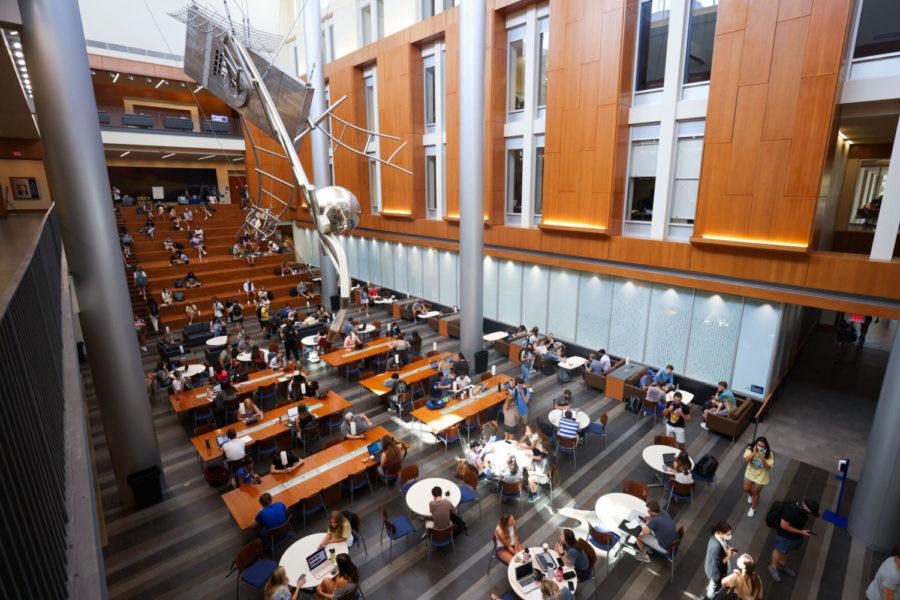UK students and faculty share excitements, concerns over a return to in-person learning
University of Kentucky students gather in the Gatton College of Business and Economics building during the first day of classes on Monday, Aug. 23, 2021, Lexington, Kentucky. Photo by Michael Clubb | Staff
September 30, 2021
UK has been back in-person for months and students and professors are still adjusting from the flexibility of at-home learning.
With mostly in-person classes and events happening physically on campus, students are no longer able to roll out of bed and into their desk chairs to attend online classes. The increased commute to class is a complete flip for students and professors alike.
“Walking to classes is a lot when the weather sucks,” said Jordan Russell, a freshman Arts & Sciences major.
The switch is a shock to students like junior psychology student Camille Harn, who said they have a lot of mixed feelings on the return to in person classes.
“I personally like having school in person, but the transition from online to in-person is like being thrown into ice-cold water, the deep end,” Harn said. “While I enjoy school in-person, I know there’s a lot of risk for COVID, especially with how high cases are. I feel confident in my vaccine that I won’t get super sick, though.”
Many students, like freshman biology major Taylor Bailey, find it easier to learn through in-person classes and are grateful for their return.
“I struggled with grades in high school when we were virtual, so being in person really helps me learn,” Bailey said. “I feel like there’s a way to stay safe if people wear masks and listen to the university’s guidelines.”
Freshman Sophie Kelley agreed, saying she is “relieved” to have classes on campus.
“Being online stressed me out, and I couldn’t focus,” she said. “I’m glad we have masks; I would feel unsafe if we didn’t.”
UK has taken measures to combat the existing concern of COVID-19, including requiring both vaccinated and unvaccinated individuals to wear masks indoors. In August, UK began requiring weekly COVID-19 testing for unvaccinated faculty, staff and students.
There are consequences for not following these guidelines. After the first missed testing period, students will have a hold placed on their accounts, preventing them from registering from classes. Faculty and staff will be sent a letter, with their supervisors copied, after their first missed testing period. The consequences continue to increase through four weeks, ending with a potential interim suspension for students and unpaid administrative leave until fully vaccinated or the four weekly testing periods are completed for faculty and staff.
Freshman finance major Ashton Roe accepts the safety masks provide, but also said they can make things difficult.
“In classes that require communication, it’s difficult with masks, but I understand the reasoning,” Roe said. “It is just hard to have conversations in certain classes, and the thought of a hybrid schedule takes away from one of the sides [of discussions], Zoom or in-person.”
Additionally, COVID is still a source of anxiety in students’ lives, including freshman computer engineering major Cameron Webne.
“Some days when people cough or sniffle, I get nervous,” Webne said.
Russell shares this anxiety; though he is not struggling in his classes, he believes their modality may change again.
“When I hear people coughing in class, I think we might go back [to being] virtual,” he said.
Dr. Michelle Sizemore, a professor in the Department of English in the College of Arts and Sciences, said she never got accustomed to online instruction, especially in her discussion-based classes.
“We had a pretty good thing going on with small groups, and it felt effortless,” she said. “As soon as we went on Zoom, it became a lot harder for everyone, both in terms of the medium … [and] also because of what everyone was grappling with being sent home, not knowing what was coming.”
Sizemore said she is appreciating the return to the community she has built with her students.
“I think there’s a palpable excitement and energy from the students,” she said. “I think that they’re enjoying this experience.”
Like Sizemore, Jeorg Sauer, a senior lecturer in French and Francophone studies, is happy about the return.
“I support in-person classes wholeheartedly. I think that [being] online works in certain situations and certain contexts, but human beings want to learn with other people,” Sauer said. “When you do attend class, you actually learn because your brain has feedback. It has facial expressions, and there are other people to talk about things with.”
However, Sauer is another UK faculty member who has reservations about the health risks of a return to in-person classes.
“My issue, at the moment, in present circumstances has to do with health and safety,” she said. “[The return] should not be at the expense of any one single human being under any circumstance, because we don’t know what everyone’s experiences are.”
Sauer has an 11-year-old daughter, who, due to her age, is still ineligible for the COVID-19 vaccine.
“I don’t want to carry that risk to her, and I don’t want to carry that risk to any of my students who might have similar circumstances or difficulties, because it’s just not equitable,” she said.




















































































































































